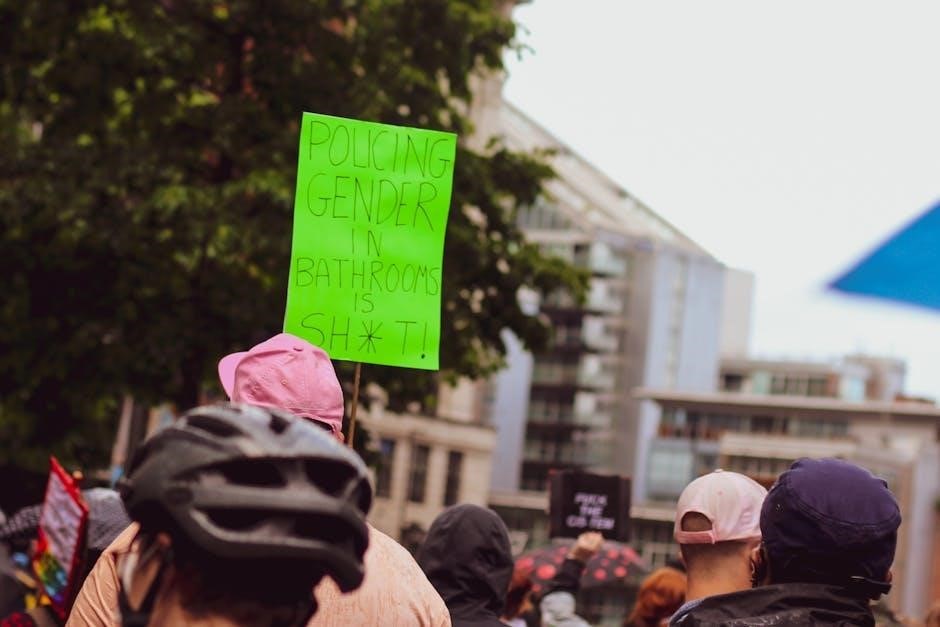Current issues in policing, as explored by Christopher James Utecht, highlight challenges such as use of force, leadership, and historical context, shaping modern law enforcement practices.
1.1. Overview of the Topic
The topic explores contemporary challenges in law enforcement, emphasizing the role of use of force, leadership, and historical context. Christopher James Utecht’s work highlights these issues, providing insights into their impact on public trust and the necessity for reforms. This overview sets the stage for understanding the complexities of modern policing.

1.2. Importance of Understanding Policing Challenges
Understanding policing challenges is crucial for fostering trust and ensuring public safety. It addresses issues like use of force, leadership, and historical contexts, which directly impact community relations. Recognizing these challenges helps identify solutions, promoting accountability and ethical practices within law enforcement. This understanding is vital for building a fair and effective justice system.
The History of Policing
The history of policing traces its roots to early informal watch systems, evolving into formalized law enforcement. This progression shaped modern policing practices and institutional frameworks globally.
2.1. Evolution of Law Enforcement
The evolution of law enforcement began with informal watch systems, progressing to formalized police forces. Over time, technological advancements and changing societal needs have shaped modern policing, emphasizing professionalism, accountability, and community-focused approaches, as discussed in Utecht’s analysis of historical and contemporary policing developments.
2.2. Historical Challenges in Policing
Historical challenges in policing include racial tensions, misuse of authority, and societal shifts. These issues have led to reforms emphasizing accountability and community trust. Utecht’s work highlights how past failures, such as excessive force and discrimination, have shaped modern policing strategies and the push for ethical leadership to address these persistent challenges effectively.
Use of Force in Policing
Use of force in policing remains controversial, with debates over brutality, accountability, and policy reforms. Utecht’s analysis highlights the need for balanced approaches to maintain public safety and trust.
3.1. Controversies Surrounding Police Brutality
Police brutality remains a contentious issue, sparking public outcry and debates over accountability. Utecht’s work examines systemic issues, racial disparities, and the erosion of trust between law enforcement and communities, emphasizing the need for reform and transparency to address these persistent controversies.
3.2. Policy Implications and Reforms
Utecht discusses potential reforms, including de-escalation training and body cameras, to address police brutality. These policies aim to enhance accountability, improve community relations, and ensure constitutional policing, fostering trust and reducing misconduct in law enforcement practices.

Technology in Modern Policing
Technology has revolutionized law enforcement, with tools like surveillance systems, data analytics, and digital evidence transforming investigative processes. However, challenges such as cybersecurity threats and the ethical use of tech remain critical concerns for modern policing strategies;
4.1. Role of Surveillance and Data Collection
Surveillance and data collection are integral to modern policing, aiding in crime prevention and investigation. Technologies like CCTV and data analytics enhance public safety but raise privacy concerns, requiring a balance between security and individual rights to maintain trust in law enforcement practices.
4.2. Impact of Digital Evidence and Forensics
Digital evidence and forensic tools revolutionize investigations, offering precise insights into criminal activities. DNA analysis, digital footprints, and cybersecurity measures help solve cases efficiently. However, reliance on technology raises concerns about data integrity and officer training, necessitating robust protocols to ensure accuracy and legal compliance in evidence handling. This dual benefit and challenge shape modern policing strategies.
4.3. Cybersecurity Challenges in Law Enforcement
Cybersecurity presents significant challenges for law enforcement, including data breaches, ransomware attacks, and securing digital evidence. Protecting sensitive information while maintaining public trust is critical. Agencies must invest in advanced technologies and training to combat evolving threats and ensure the integrity of their systems in an increasingly digital landscape.

Leadership and Ethics in Policing
Effective leadership is crucial for ethical policing, fostering trust and accountability; Strong leaders guide officers in making sound decisions, upholding integrity, and addressing moral challenges in law enforcement.
5.1. Importance of Quality Leadership
Quality leadership in policing is essential for fostering trust, accountability, and integrity within law enforcement. Effective leaders inspire officers to uphold ethical standards, make sound decisions, and navigate complex challenges. Strong leadership cultivates a positive organizational culture, ensuring that police departments operate with transparency and fairness, ultimately benefiting both officers and the communities they serve.
5.2. Ethical Challenges Faced by Police Officers
Police officers encounter ethical dilemmas daily, such as balancing authority with accountability, addressing biases, and navigating use of force incidents. Ethical challenges often stem from complex situations requiring immediate decisions, which can impact public trust and officer integrity. These issues highlight the need for robust training, clear policies, and a commitment to transparency to uphold ethical standards in policing.

Community Relations and Trust
Building trust between law enforcement and communities is crucial for effective policing. It requires mutual respect, open communication, and transparency to foster cooperation and public confidence in police actions.
6.1. Building Public Trust
Building public trust requires transparency, accountability, and ethical behavior. Police must engage communities through open dialogue, ensuring actions reflect fairness and respect. Positive interactions foster trust, while addressing systemic issues strengthens relationships. Collaboration with community leaders and organizations can bridge gaps, promoting mutual understanding and cooperation. Trust is the foundation for effective policing and community safety initiatives to thrive.
6.2. Strategies for Improving Community Relations
Strategies include implementing community policing initiatives, fostering cultural sensitivity, and ensuring transparency in operations. Engaging in open dialogue with residents and involving them in decision-making processes strengthens bonds. Providing regular updates on police actions and outcomes also builds credibility. Collaborative problem-solving and recognizing community contributions further enhance relationships, creating a mutual sense of responsibility for public safety and well-being.

Legal Issues and Police Accountability
Police accountability involves legal reforms, transparency measures, and oversight mechanisms to ensure officers operate within the law, addressing misconduct and fostering trust through fair judicial processes.
7.1. Police Accountability and Transparency
Police accountability and transparency are crucial for building trust. They involve measures like body cameras, civilian oversight boards, and public reporting of incidents to ensure officers act ethically and within legal boundaries, fostering accountability and openness in law enforcement operations and decision-making processes to maintain public confidence and integrity in policing.
7.2. Legal Reforms and Their Impact
Recent legal reforms aim to address policing challenges, promoting accountability and transparency. These reforms often focus on use of force policies, oversight mechanisms, and civil liability. Their implementation has led to improved public trust in some cases, though challenges remain in balancing safety with individual rights, highlighting the complexities of modern policing and the need for ongoing legal adaptation.

Global Perspectives on Policing
Global perspectives on policing highlight international cooperation and comparative strategies, offering insights into diverse law enforcement approaches and challenges worldwide.
8.1. International Cooperation in Law Enforcement
International cooperation in law enforcement is crucial for addressing transnational crimes. Agencies worldwide collaborate through organizations like Interpol to share intelligence and strategies, enhancing global security and fostering mutual trust among nations to combat issues like cybercrime and terrorism effectively.
8.2. Comparative Analysis of Policing Strategies Worldwide
A comparative analysis of policing strategies reveals diverse approaches globally, with some nations emphasizing community-based models while others focus on technology-driven enforcement. These strategies reflect cultural, legal, and societal contexts, offering insights into effectiveness and challenges, while highlighting the need for adaptability in addressing unique regional security demands and fostering collaboration.
The Role of Training and Education
Modern policing demands continuous training and education to address evolving challenges, ensuring officers are equipped with the skills and knowledge to maintain public safety and adapt to new strategies effectively.
9.1. Modern Training Methods for Police Officers
Modern police training emphasizes immersive simulations, scenario-based learning, and mental health awareness. Officers engage in de-escalation techniques and cultural sensitivity training to enhance community interactions. Advanced technologies like virtual reality are increasingly used to replicate real-world situations, ensuring preparedness for high-stress scenarios. Continuous education and adaptability are prioritized to address evolving challenges and foster trust between law enforcement and the public.
9.2. The Importance of Continuous Education
Continuous education is vital for police officers to stay updated on legal reforms, technological advancements, and ethical practices. It ensures officers adapt to changing societal needs, enhancing their ability to serve effectively. Ongoing training fosters professional growth, improves decision-making, and maintains public trust, ultimately contributing to safer communities and a more responsive law enforcement system.
Public Perception and Media Influence
Public perception of policing is shaped by media coverage, particularly high-profile incidents, influencing trust, accountability, and community relationships significantly.
10.1. Media’s Role in Shaping Public Opinion
The media plays a crucial role in shaping public opinion on policing through selective coverage of high-profile cases, influencing perceptions of law enforcement’s effectiveness and fairness. Sensationalized reporting often amplifies controversies, while balanced narratives may foster understanding. This dynamic highlights the media’s power in swaying trust and accountability, making it a key factor in modern policing challenges.
10.2. Impact of High-Profile Cases on Policing
High-profile cases significantly influence policing practices and public trust. They often spark debates on systemic issues, leading to calls for reforms. Media coverage amplifies their impact, prompting policy changes and altering community relations. These cases serve as catalysts for reevaluating law enforcement strategies and accountability measures, shaping the future of policing.
Policing faces evolving challenges, requiring adaptive strategies. Future reforms will focus on technology integration, ethical leadership, and community trust to ensure effective and equitable law enforcement practices.
11.1. Summary of Key Issues
Current issues in policing, as discussed, include controversies surrounding use of force, ethical challenges, and the importance of quality leadership. These challenges impact public trust and police effectiveness, necessitating reforms to address transparency, accountability, and community relations. The integration of technology and ethical training remains critical for fostering equitable and modern law enforcement practices.
11.2. The Future of Policing
The future of policing lies in integrating advanced technology, fostering ethical practices, and building stronger community ties. Innovations like AI and data analytics will enhance efficiency, while emphasizing transparency and accountability will rebuild trust. Continuous training and ethical leadership will be pivotal in addressing evolving challenges and ensuring equitable law enforcement for all communities.
